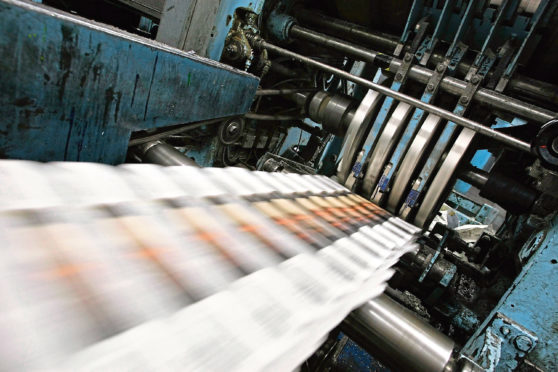If the pessimists are to be believed, nobody reads newspapers anymore, and print on paper is in terminal decline.
Having spent more than 40 years in newspapers and witnessing the seismic changes the industry has undergone, I was almost starting to believe the prophets of doom.
Almost. My lingering confidence in the resilience of newspapers such as this was boosted considerably following a column I wrote earlier this month highlighting the difficulties I was encountering becoming a charity volunteer. Within hours of it appearing, I started to receive overtures from several local charities all offering an outlet for my spare time.
The opportunities on offer included serving on the Scottish Children’s Panel, (I’m not good with children) working with Sport Aberdeen (I’m not good with sport) and joining Aberdeenshire Voluntary Action, which is charged with supporting charities throughout the county. I also received a very apologetic message from the Royal Voluntary Service, explaining that an IT problem had caused the delay in responding to my offer to work as a volunteer driver and expressing the hope that I would still be interested, which I am. That is now back on track and progressing steadily.
Disturbingly, however, I received a number of calls from people who had experienced the exact same difficulties I had and it is clear that there is a problem in the system. One such victim was a young great-niece, living in Northern Ireland, who is undertaking her Duke of Edinburgh award, which requires her to carry out some voluntary work. Despite numerous applications, she has been unsuccessful, and many of the organisations she has approached have not even bothered to reply. It does beg the question: why? And are those same non-communicative charities as uninterested when a would-be benefactor makes contact? I suspect not.
What the management of these charities need to understand is that their failure to treat people with common courtesy will ultimately backfire when they start to rattle the collecting tins. For my part, a one-time keen desire to help the Scottish SPCA, fuelled by my love of animals, has now been replaced with something approaching contempt. And all because it couldn’t be bothered to send a rejection letter.
++++++++++++++++++++++++++++++++++++++++++++++++++++++++++++
Anyone who thought that removing Theresa May from 10 Downing Street and replacing her with Boris Johnson was going to make the slightest difference to the shambolic political landscape should by now have realised that nothing has changed except the cast.
Just a week into Boris’s premiership, the divisions which brought about Mrs May’s demise have already started to reappear. And those divisions will, if anything, become even wider as the UK lurches towards what now seems certain to be a no-deal Brexit. The Prime Minister’s pledge that Britain will leave the EU on October 31, come what may, could well be a negotiating tactic designed to concentrate minds in the rest of Europe, but right now it appears to have had little effect on the EU’s repeated insistence that the withdrawal agreement negotiated by Mrs May is not open for re-negotiation. We have arrived at an impasse.
The whole sorry drama has exposed politicians of all parties as self-serving charlatans and I have never before seen such frustration among voters as the very people elected to carry out their wishes decide instead to pursue their own agenda, shamelessly misinterpreting the outcome of the 2016 referendum in the process. Time after time, those campaigning for a re-run justify their stance by claiming that “no-one voted for a no-deal Brexit”.
Now I may be getting on in years, and time may well have degraded the old brain cells, but I seem to remember that the question we were asked was a straightforward choice between leaving and remaining. For the record, and to head off any suggestion I am guilty of the same duplicity as our politicians, I voted to remain, based purely and simply on concern about the effect leaving would have on the economy. I do, however, accept that I was in the minority and firmly believe that the mandate to leave should be delivered. Quite how that can happen is another matter.
Suggestions at the weekend that former Chancellor and staunch Remainer Philip Hammond has been holding secret talks with Labour politicians with a view to derailing the no-deal scenario come as no real surprise and simply underlines the treachery and duplicity which have been on display throughout. Many people are speculating that the stalemate can only be resolved by either a second referendum or a General Election, but both will lead us back to the same position in which we now find ourselves – a country split down the middle and no obvious way in which the divisions can be healed.
A sorry, sorry mess.
Derek Tucker is a former editor of the Press and Journal

